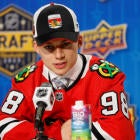In the fall of 2005, NHL rinks were emblazoned with the slogan "Thank You Fans," as the league resumed play following its lost 2004-05 season. What will be on the rinks this coming Saturday? Certainly, the NHL will have some new, snappy marketing campaign to remind the fans they spurned the past four months. The league wasted no time last Saturday evening in getting the message up on its website, seemingly minutes after the NHLPA ratified the CBA, launching their "Hockey's Back" campaign.
Along with the barrage of ads on the NHL's home page is their "Hockey's Back" video. A montage that opens with idyllic and wistful images of snow-covered trees and frozen ponds, talking of rituals, passion and the purity of a sheet of ice after the Zamboni has run across it. Sounds like enough to make fans forget the lockout, right?
The obvious question is, where did hockey go and why did it go there? The league just says it's back, as if Gary Bettman and Bill Daly stumbled upon it in their closet, conveniently ignoring the fact they are the ones who lost it.
Erik Karlsson, late first rounder?
Overall statistics are going to be skewed by the reality of a shortened 48-game season, leaving points-per-game to be even more meaningful this season for defensemen. Expect Ottawa's Erik Karlsson to challenge the elusive point-per-game pace among blue-liners, but Karlsson's skill is astounding, a curve-breaking player polluting the data for all other defenders. After last season's 19 goals and 78 points in 81 games, it's reasonable to expect a similar rate of production from the still-developing Norris Trophy winner. Not since the drafts of 2009 and 2010 and Mike Green has a defender been linked to a late first-round pick. The types of numbers Karlsson put up last season and those that Green produced from 2008 to 2010 have only happened three times since the lockout before the lockout that just ended.
An argument can easily be made for Karlsson being a late first-round pick after the elite scorers and goaltenders have been snagged. Seriously, you have to figure your first eight picks of most drafts will feature Steven Stamkos, Sidney Crosby, Evgeni Malkin, Henrik Lundqvist, Jonathan Quick, Claude Giroux and Pekka Rinne (possibly Alex Ovechkin as well). Even if Karlsson does not produce a point per game, he'll be so far ahead of most of his blue-line brethren that it won't be a wasted pick. Karlsson's 59 assists last season were tied for third best in the NHL with Giroux and Joe Thornton. Those same 59 assists represented six more total points than the league's No. 2 scoring defenseman, Florida's Brian Campbell (53).
Eyeing up Karlsson late in the first round and early second round will put him in the company of James Neal, Corey Perry, John Tavares, the Sedin twins and Ilya Kovalchuk, not to mention the second tier of elite netminders after the dominant ones have been snagged.
Those drafting toward the end of the first round will be comforted by knowing they can still snag a high-end goal-scorer and possibly Erik Karlsson there. The odds of Karlsson lasting until the end of the third round are almost null, but the next level of goal-scorers will be available: think Marian Gaborik, Jordan Eberle, Rick Nash and Bobby Ryan. Selecting Karlsson with one of those first two corner picks will solidify your defense for an extra round or two, while offering comparable assist totals to some of the league's elite set-up men as well as a boatload of power play points and shots on goal. Karlsson is the outlier among defensemen, putting himself clearly ahead of even a player like Zdeno Chara, who's a monster in multi-category leagues.
If you want to nitpick, Karlsson won't pick up too many penalty minutes, leaving you possibly to have to "settle" for Chara early in the third round. Those picking late in the first round will seriously have to consider spending that pick on Karlsson, a pick that could pan out quite nicely.
Striking Oil?
It's rare for hockey fans and poolies to bestow so much hype on a player that has never skated a minute in the NHL, but there is a palpable buzz coming out of Edmonton regarding the potentially budding star on their back end, Justin Schultz. A standout at the University of Wisconsin, Schultz refused to sign with Anaheim, the club that drafted him in 2008, and ended up inking a free-agent contract with the Oilers, giving Northern Alberta an exciting group of players not seen since the 1980s.
Schultz has done essentially everything to earn this hype, having lit up the American Hockey League during the lockout along with Ryan Nugent-Hopkins, Taylor Hall and Eberle for Oklahoma City, registering 18 goals and 48 points through 34 games, second overall in the league. The potential the Oilers have to explode offensively is staggering -- their power play could be lethal. However, scoring power-play goals against minor leagues in the "A" is be a bit different than executing in the Western Conference. Schultz is an excellent skater and, by all accounts, a solid defender, but will he be able to dominate in the NHL the way he did in Oklahoma City?
The Oilers aren't terribly deep on defense. Nick Schultz is a solid stay-at-home defender acquired from Minnesota last February and Ryan Whitney can be effective when not maimed. However, the names Ladislav Smid, Jeff Petry, Theo Peckham and Corey Potter do not connote sound defensive play. Not to mention Devan Dubnyk and Nikolai Khabibulin in the Oilers' goal.
Given the buzz around Schultz, it's not unreasonable to believe he will be snagged earlier than he should on draft day and the return very well could be handsome. Don't be surprised at all if Schultz is one of the top seven to 10 defenders taken, his potential is unlike any seen for a rookie rearguard since possibly Dion Phaneuf's Calgary debut.
However, considering the price you'll have to pay for Justin Schultz, his lack of track record and expectations surrounding him, it may be better to let Schultz go in favor of a more reliable forward or steadier, proven defenseman. Passing on a talented rookie isn't sexy, but it's safe. (However, if he's still there at a spot that will yield value, grab Schultz and don't look back). There will be less room for error in a shortened season and missing on defense with a high pick could hurt. Schultz is talented, there's no doubt, but Edmonton's supporting cast outside of his power-play buddies is not the most reliable group of players. Caveat Emptor.
Blue Line Tiers
The listings below assume a standard league starting five defensemen with goals, assists, plus-minus, power-play points, shots on goal and penalty minutes as categories. Getting an elite defenseman or two before the fourth round is a good way to solidify the position for several picks while rounding out the goaltending position and acquiring goal-scoring forwards.
There is always value to be had late amongst defensemen, be it in veterans like Dennis Wideman (Calgary), Dennis Seidenberg (Boston), Marek Zidlicky (New Jersey) and Joni Pitkanen (Carolina) or rising young talents such as Columbus's Nikita Nikitin, Stefan Elliott and Slava Voynov.
Defensemen that can challenge 22 to 25 points in the 48-game season should offer more value than a 25-to-30-point forward, who will be much more plentiful. Expect most defensemen labeled as offensively minded to hover in the 0.33 to 0.45 points-per-game range with a select few challenging a point every two games or greater.
(Erik Karlsson has been excluded from these tiers due to his late first, early second-round status).
Elite
These are the players who stand out among high-scoring forwards
When to draft them: Target in late second/early third round
Zdeno Chara , Bruins: No rival in multi-category production.
Kris Letang, Penguins: Concussion derailed a potential 60-plus-point season last year. Expect him to play close to a point per game.
Shea Weber, Predators: Big numbers to go with big paycheck. Boost in leagues that reward shots, likely one of few defenders to challenge 12-plus goals.
Not Quite Elite
Most of your top goal scorers will be gone by this time, leaving assist-gathering forwards amid potentially strong blue-liners. Defensemen who can produce assists and a handful of goals will have more value than play-making forwards this season.
When to draft them: Target in rounds four and five
Alex Pietrangelo, Blues: Budding star on a talented young squad.
Keith Yandle, Coyotes: Great playmaker and double-digit goal potential.
Dustin Byfuglien, Jets: Tremendous points-per-game potential, big shot and PIM totals.
Alexander Edler, Canucks: Nagging back injury is behind him and he's on the power play with the Sedin brothers.
Michael Del Zotto, Rangers: Can easily make a case for MDZ to be higher. Great skater with high skill level and is much-improved defensively. Signed a two-year deal Sunday to play in New York.
P.K. Subban, Canadiens (RFA): Subban is a restricted free agent negotiating a contract. He's an elite talent who showed growth last year. Potential is there for a huge season in terms of shots, goals and hits. Could be league's next elite defender. Doubtful that Montreal trades him. Likely to be signed.
Second Tier
Can easily make an argument for these defenders being taken before some of the more reliable ones.
When to draft them: Rounds six through 10
Kevin Shattenkirk, Blues: Consecutive 40-point seasons and he's on a power-play with David Perron and Alex Pietrangelo.
Brian Campbell, Panthers: An assist machine, No. 2 in defenseman scoring last year, but might challenge five goals. Safe, unspectacular pick.
John Carlson, Capitals: Increased his point total, good supporting cast in Washington. Will be in Adam Oates's attacking system.
Old Reliable
There's nothing flashy about these players, but several of them should challenge double-digit goals and a points-per-game pace of 0.50 while adding in peripheral stats.
When to draft them: Rounds six through nine
Dan Boyle, Sharks: Nothing but consistency. Lacks upside, but his ceiling is fine.
Dion Phaneuf, Maple Leafs: Few players in the league are under the scrutiny he is. Should put up 22 to 25 points with plenty of shots and PIMs.
Mark Streit, Islanders: Quietly consistent on a team struggling offensively. Great source of power-play production alongside John Tavares and Matt Moulson.
Ryan Suter, Wild: Registers close to a point every two games, third among defenders in power-play assists last season. Expect him to rake in helpers in Minneapolis, just don't pay what the Wild did for his services.
Drew Doughty, Kings / Duncan Keith, Blackhawks: Neither will light the lamp with regularity, but should come close to 25 points in the brief campaign. (Pass over these two in favor of players with more upside).
Goal-scoring defensemen with lower point totals
When to draft them: Rounds 10 and after
Oliver Ekman-Larsson, Coyotes: One of a handful to crack double-digit goals last year. Young, likes to shoot, meshes well with Keith Yandle.
Jason Garrison, Canucks: Huge free agent contract. He scored 16 goals last year and is not afraid to fire the puck. Better offense around him than he had in Florida.
Christian Ehrhoff, Sabres: Heavy shot blue-liner who struggled following his signing with Buffalo. Sabres will have a dynamic offense, so expect a bounce-back.
Nicklas Kronwall, Red Wings: Will see more chances with Nicklas Lidstrom retired. Give him a boost in leagues that reward shots and hits.
Rising Young Talents
Justin Faulk, Hurricanes: Tied for the defensemen rookie lead in goals with eight while chipping in 14 assists. Carolina is on the rise and its power play features three high-end goal scorers (Alexander Semin, Jordan Staal and Eric Staal).
Jake Gardiner, Maple Leafs: Gardiner's name has been thrown around in Roberto Luongo trade rumors, but he snagged 30 points last season with the Leafs.
Roman Josi, Predators: One of the candidates to fill in opposite Shea Weber on the power play, Josi could be pushed by Ryan Ellis provided Ellis makes the opening day roster.
Slava Voynov, Kings: Snagged eight goals in several different stints with the Kings last year. Huge shot and no more Jack Johnson to take his power-play time.




















